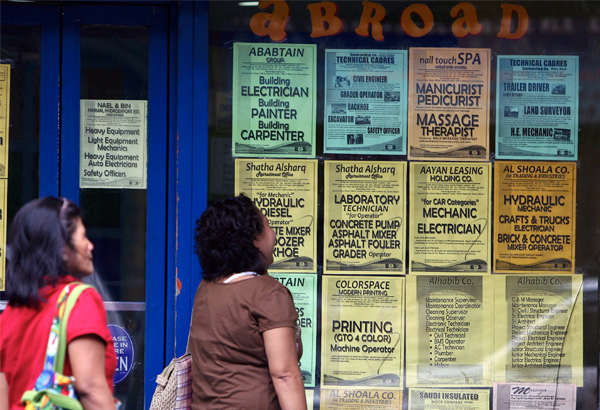Sadly, many overseas Filipino workers (OFWs), in the hopes of getting an overseas job that can help them provide for their families, often fall prey to illegal recruiters. Despite the Philippine Overseas Employment’s (POEA) efforts to track down illegal recruiters, many are still active in victimizing Filipinos who aspire to seek greener pastures in another country.
Don’t let your dreams shatter by becoming one of their victims. Here are some things you need to know about illegal recruitment.

PHOTO CREDIT: PhilStar
Identifying an illegal recruiter
- Immediately asks for a placement fee or other fees without issuing receipts
- Promises quick departure
- Requires medical examination or training even without a contract or a potential employer
- Conducts transactions with clients in public places like restaurants, malls and other places
- Goes from house to house to recruit applicants
- Does not give appropriate and sufficient information about the job
- Tells applicants that they don’t need to go to POEA since they are in talks with a direct employer
- Promises quick departure through tourist visa
- Unable to show employment contract or working visa
- Unable to show ID despite claims that he or she is working for a licensed recruitment agency.
- Claims to be connected to a travel agency or training center
- Encourages clients to look for other clients to speed up processing
- Unable to give appropriate and sufficient information about himself or herself
- Promises to forward documents to POEA for processing (often observed in cases of EPS-Korea)
Avoiding illegal recruiters
- Don’t apply at recruitment agencies not licensed by the POEA.
- Don’t make transactions with licensed agencies without job orders.
- Don’t transact with any person who is not an authorized representative of a licensed recruitment agency.
- Don’t make transactions outside the registered address of the agency. If recruitment is made in a province, make sure that the agency has a provincial recruitment authority.
- Your placement fee should just be equivalent to a month’s salary not including documentation and processing fees.
- Make sure to have a valid employment contract and an official receipt before paying any placement fee.
- Don’t fall victim to ads requiring you to reply to a P.O. box and enclose payment for processing of documents.
- Don’t transact with travel agencies as well as training centers promising overseas employment.
- Don’t accept a tourist visa.
- Don’t transact with fixers.
